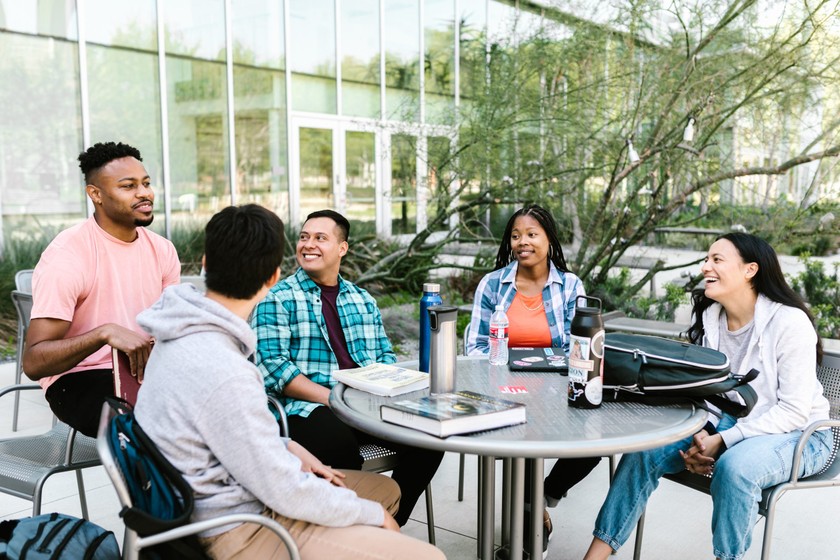
September 15th to October 15th is Latinx Heritage Month in the United States. This Heritage Month, according to the U.S. Department of State, celebrates the countless contributions of Hispanic Americans, Latinos, Latinas, and Latinx-identifying people to our culture and society. In 1968, Congress set aside a week for this observance and two decades later set it to a month. The Hispanic population in the United States is approximately 63.7 million as of July 1, 2022, making it the nation’s largest racial or ethnic minority — 19.1% of the country’s total population.
To celebrate Latinx Heritage Month, in collaboration with the cultural centers, Dr. Tara Yosso, who coined the Community Cultural Wealth model, came to visit UConn. She was involved in an interactive community dialogue as well as presentations on her Cultural Wealth Model. Cultural Wealth is defined as: an array of knowledge, skills, strengths and experiences that are learned and shared by people of color and marginalized groups; the values and behaviors that are nurtured through culture work together to create a way of knowing and being. The Cultural Wealth Model features Six Forms of Cultural Capital that students of color have access to and have earned to counter the narratives of “cultural deficit.” It can help reduce feelings of imposter syndrome in both a collegiate and professional setting.
The Six Forms of Cultural Capital, defined by Dr. Yosso are:
- Aspirational Capital: The ability to maintain hope and dreams for the future in the face of real and perceived barriers.
- Familial Capital: Recognizing and utilizing extended family and community members to enhance social and personal human resources that will assist you as you navigate to and through college.
- Linguistic Capital: The sum intellectual, social and communication skills attained through a particular language, history and experiences.
- Navigational Capital: Refers to a student’s ability to navigate “social institutions”, where “navigational capital empowers them to maneuver within unsupportive or hostile environments”
- Resistant Capital: Resistance is passed down from generation to generation. It is the ability for marginalized populations to persist and resist in the face of oppression and opposition to become empowered. Your legacy of resistance will assist you as you navigate your institution and create change in your community and campus community.
- Social Capital: Social capital is leveraging existing community resources and connections in building a network in support of your goals.
For additional information about the Cultural Wealth Model, read Community Cultural Wealth: Embracing & Appreciating Your Experiences.
Through your on-campus involvement, you can begin to or further be in touch with your own Cultural Wealth. Here are a few ways you can get involved on-campus this semester and beyond:
- Engage in opportunities for professional and self-development.
- The Center for Career Development is a wonderful resource for engaging with professional development. No matter what stage you are at in your career journey, we are ready to help you, come as you are!
- Join a Professional Society or Organization based on your major or academic interests.
- Professional Societies and Organizations are a great way to get involved with other students and professionals in your career field. You can choose professional organizations based on your Affinity Community, within an academic interest or Career Community, or both. You can also utilize UConntact to become involved with Professional Societies.
- Join a Cultural Organization.
- Cultural organizations can be found under UConntact or under the Affinity Communities and Cultural Centers they pertain to.
- Join a Multicultural Greek Organization.
- There are several Multicultural Greek Organizations available to students based on but not exclusive to a common identity. It presents a fantastic chance to meet other students within a similar identity with different paths. You can learn more about the various organizations on UConntact as well as through the Intercultural Greek Council.
- Engage in Leadership opportunities.
- One great resource for beginning to explore your Leadership capabilities is the office of Leadership & Organizational Development. Similarly, you can be involved in the Executive boards of Clubs and Organizations to build your Leadership. Alternatively, under the Puerto Rican / Latin American Cultural Center (PRLACC), there are over 20 organizations linked to the Latinx Student Leadership Council, or the LxSLC. This council provides students involved in the affiliated groups with additional opportunities for leadership development.
- Involve yourself in Service Opportunities in your community and/or while at UConn.
- Take courses on various topics such as Race, Gender and Sexuality, Language, and Ethnicity.
- There are amazing courses offered that can be found listed on the Course Directory. The Office of Diversity, Equity, and Inclusion offers One-Credit Courses on Diversity, Equity, Inclusion, and Justice, available to any and all students. These classes provide possibilities for enrichment and the expansion of your understanding and knowledge.
It is never too late to begin your involvement while here at UConn. For career development support, schedule an appointment with our career coaches. For Latinx Students, visit our Latinx Affinity Community page for more information and resources! Our heritage should be celebrated, today and every day.
Photo Credit – Photo by RDNE Stock project: https://www.pexels.com/photo/people-doing-a-group-study-7683704/
